Understanding Modern Morgue Stretchers: A Buyer's Guide
A morgue stretcher is specialized equipment designed for the respectful transport of deceased individuals within funeral homes, morgues, and medical facilities. These stretchers typically feature:
- Weight capacity: 400-1200 lbs depending on model
- Construction: Stainless steel or anodized aluminum
- Height range: Adjustable (typically 14"-35")
- Special features: Fluid drainage tops, lockable wheels, privacy covers
- Price range: $1,000-$5,000 based on features and capacity
When selecting a morgue stretcher, funeral directors must balance durability, functionality, and budget considerations. Modern mortuary stretchers have evolved significantly to address ergonomic concerns, safety requirements, and the diverse needs of today's funeral service professionals.
The right morgue stretcher serves as more than just transportation—it's a critical tool that impacts workflow efficiency, staff safety, and the dignity afforded to the deceased and their families. With options ranging from standard 500-lb capacity models to specialized bariatric stretchers supporting over 1,000 lbs, today's market offers solutions for facilities of all sizes.
I'm Mortuary Cooler, a national-level supplier of mortuary equipment with extensive experience helping funeral homes select the appropriate morgue stretcher for their specific needs and facility constraints. My team has equipped hundreds of funeral homes across America with customized solutions that prioritize both functionality and respectful handling.
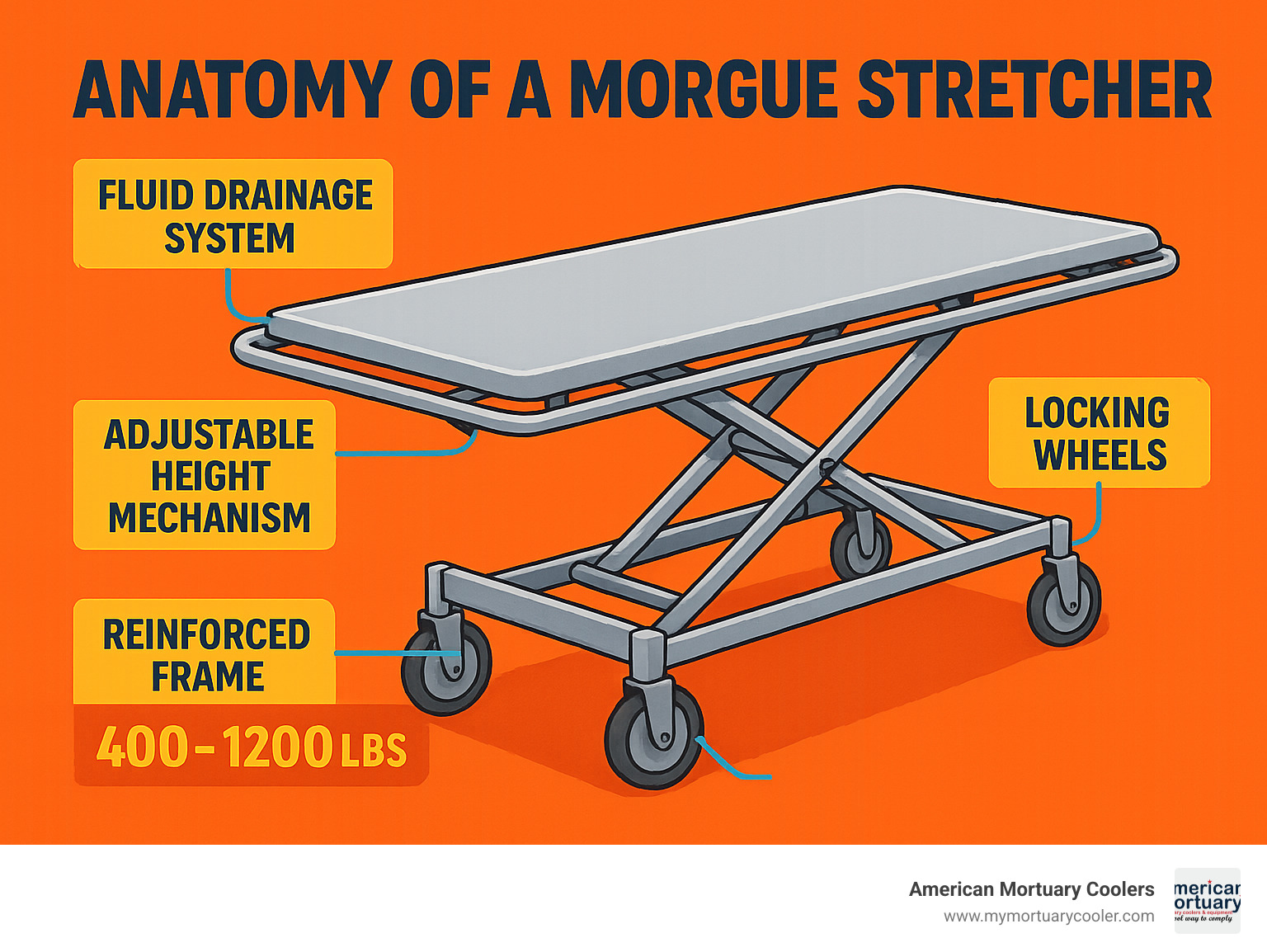
Relevant articles related to morgue stretcher:
What Is a Morgue Stretcher?
When you hear the term morgue stretcher, you might picture something clinical and sterile. In reality, these specialized tools (also called mortuary cots or cadaver carriers) are thoughtfully designed to provide dignified transport for those who have passed away. Unlike medical stretchers meant for living patients, a morgue stretcher addresses the unique needs that arise after death.
Think of these stretchers as the unsung heroes of the funeral profession – they're the primary transportation method throughout the entire death care journey. From the initial, often emotional moment of retrieving someone from their place of death, to moving them between preparation areas and cooler storage, and finally to their place of final disposition, these stretchers serve a critical purpose.
"Having equipment you can count on is paramount in your day-to-day operations," as one of our customers who regularly uses the MOBI F500 model shared with us. When funeral professionals are helping families through their most difficult moments, the last thing they need is equipment concerns.
Core Functions and Use Cases
The morgue stretcher serves as the foundation of practical funeral service operations. It enables funeral professionals to perform several essential tasks with dignity and efficiency:
Initial retrieval is often the first service a funeral home provides. Whether from a private home, hospital, nursing facility, or accident scene, a quality stretcher makes this process respectful and efficient. The loading and transport phase requires features like adjustable heights and secure locking mechanisms to ensure safe transfers into and out of removal vehicles.
Many modern morgue stretchers now include privacy canopies or covers that maintain dignity during transport through public spaces – a thoughtful feature that families deeply appreciate. And within funeral facilities, these stretchers support seamless movement between autopsy suites, preparation rooms, viewing areas, and refrigerated storage.
As one Tennessee funeral director told us: "We've transported 500-pound cases on several occasions, and our stretchers still work like new. The multi-level adjustment has been invaluable for single-person retrievals in tight spaces."
Morgue Stretcher vs Medical Stretcher: Key Differences
While they might look somewhat similar at first glance, morgue stretchers differ from medical stretchers in important ways that reflect their specialized purpose:
The most notable difference is in fluid management – morgue stretchers typically feature recessed stainless steel tops with drainage channels, while medical stretchers have flat, sealed surfaces designed for patient comfort. Weight capacity also differs significantly, with mortuary options typically supporting 500-1200 pounds compared to the 350-700 pound range of medical versions.
The frame design of a morgue stretcher is reinforced for static weight rather than patient movement, and many include privacy features like canopy covers that aren't necessary for living patients. Many mortuary models are designed for single-operator use, unlike medical stretchers that typically require two handlers. And while medical stretchers prioritize patient comfort with padded surfaces, mortuary versions use firm, easily cleanable materials that support proper infection control.
These thoughtful design differences reflect the unique requirements of posthumous care and the practical needs of funeral service professionals who use these tools daily.
More info about Heavy-Duty differences
7 Common Types of Morgue Stretchers (and When to Use Them)
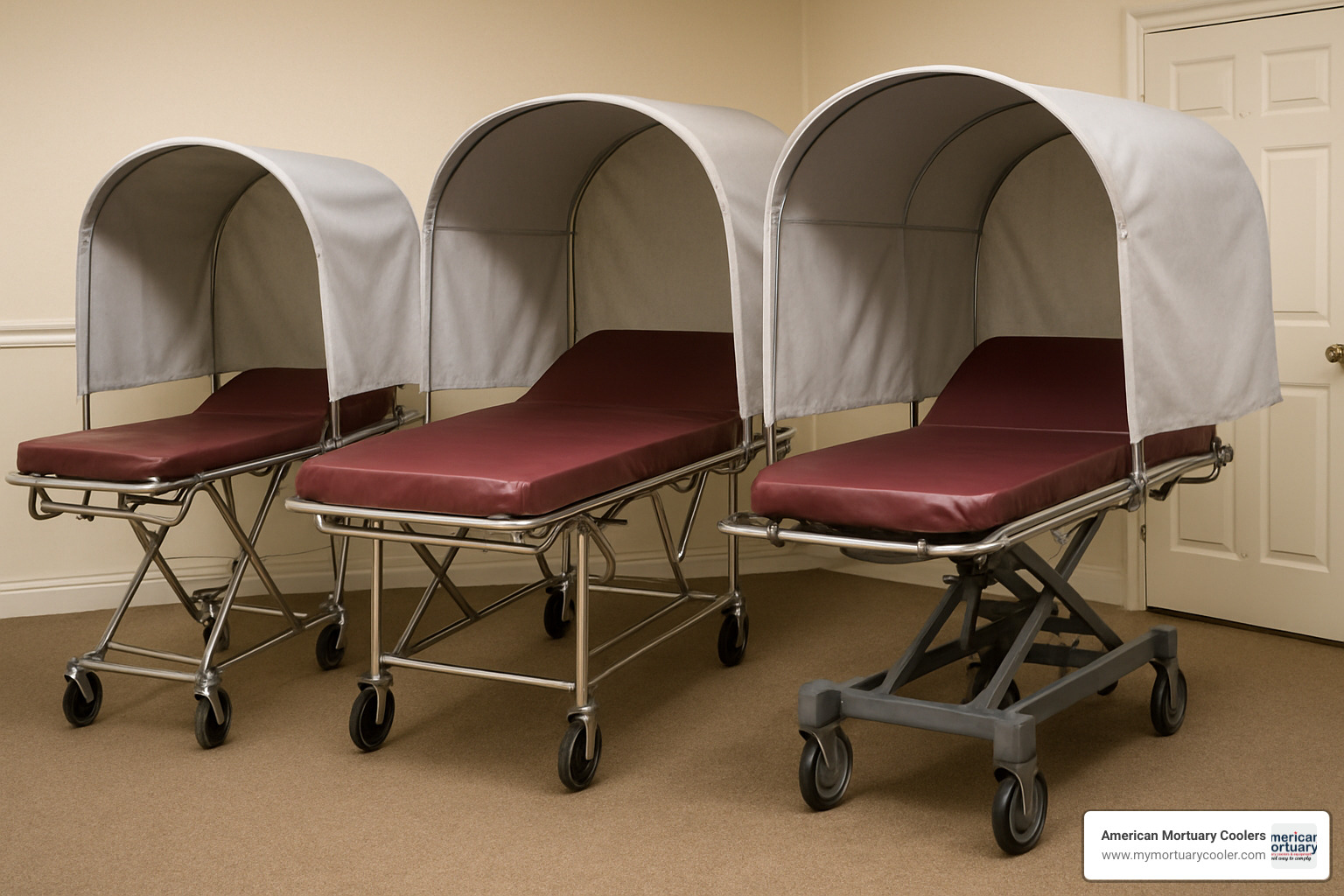
When it comes to handling the deceased with dignity and care, choosing the right morgue stretcher makes all the difference. The mortuary industry has evolved to offer specialized equipment for various needs – from standard removals to unique situations that require specialized solutions. Let's explore the options that help funeral professionals provide the best service while protecting their staff.
Standard Morgue Stretcher
Think of the standard morgue stretcher as the reliable pickup truck of the funeral industry – it handles most jobs with ease and doesn't break the bank. These workhorses typically support about 500-600 pounds and feature lightweight aluminum frames that won't weigh down your staff.
The MOBI F500 is a perfect example, offering a comfortable 76" × 22" platform with height adjustments from 14" to 32". This versatility makes it ideal for everyday use in most funeral homes.
As one funeral director told us with a smile, "Our MOBI F500 is a true workhorse cot and makes us look good!" After two years of daily use, that's saying something!
Bariatric Morgue Stretcher
America's changing demographics have created new challenges for funeral professionals. Bariatric morgue stretchers address this reality with beefed-up capacity (750-1200+ pounds) and wider platforms (typically 28-32" versus the standard 22").
The impressive MOBI F1200 stands out in this category with its 1200-pound capacity and reinforced chassis. One funeral home shared their experience: "We successfully transported an 860 lb body with the F1200, and its all-terrain wheels handled the situation flawlessly." These stretchers ensure dignity for larger individuals while protecting your staff from potential injuries.
Hydraulic Morgue Stretcher
Your back will thank you for investing in a hydraulic morgue stretcher. These models use foot-controlled hydraulic systems to minimize physical strain during height adjustments – a blessing when you're making multiple removals in a single day.
The Techlem 5000C exemplifies this category with smooth hydraulic operation supporting up to 600 pounds. The expanded height range (typically 22" to 35½") allows for perfect alignment with vehicles, coolers, and preparation tables, reducing awkward lifting and potential staff injuries.
Folding & Pole Stretchers
Sometimes you need to steer tight spaces or reach difficult locations. Folding morgue stretchers shine in these scenarios with their lightweight, collapsible design. Perfect for cramped stairwells, narrow hallways, or remote locations, these stretchers often feature break-apart poles for compact storage.
Many removal services keep these as backup equipment or specifically for challenging access situations. Their minimal moving parts ensure reliability when you need it most, even in less-than-ideal conditions.
Multi-Level & Roller Rack Compatible
Space comes at a premium in most funeral homes. Multi-level morgue stretchers address this by integrating with vertical storage systems and coolers. These specialized designs allow for stacking configurations and smooth transfers between surfaces without lifting.
The MOBI Multi-Directional Loading Mortuary Roller Rack pairs perfectly with compatible stretchers. As one satisfied customer noted, "We purchased the 4-Tier MOBI rack, and the level of space efficiency is heads and shoulders above what we had before." This integration can transform your facility's workflow and maximize your available square footage.
Concealed Removal Cadaver Stretcher
Discretion matters, especially when transporting the deceased through public areas. Concealed morgue stretchers feature privacy canopies and hospital-like appearances that maintain dignity while minimizing attention.
The Amico Titan Cadaver Stretcher uses clever design elements to resemble a standard medical stretcher while concealing its true purpose. These models often include quiet-rolling wheels to minimize noise during transport – a thoughtful touch for sensitive situations in hospitals and care facilities.
Vehicle-Specific Morgue Stretcher
Your removal vehicle and morgue stretcher should work together as a team. Vehicle-specific models are designed with dimensions that perfectly match particular transport vehicles, especially SUVs and vans with higher floors.
The MOBI F500-T is built specifically for high-loading vehicles like Suburbans, Explorers, and Econoline vans. One funeral director shared, "The raised end is actually better than a ramp for our taller van." This perfect matching eliminates awkward loading situations and reduces strain on your staff.
[LIST] of stretcher types to consider based on your funeral home's specific needs includes standard, bariatric, hydraulic, folding, multi-level, concealed, and vehicle-specific options – each serving a distinct purpose in modern funeral service.
Key Features, Materials & Specs That Matter
Choosing the right morgue stretcher isn't just about finding equipment that works—it's about investing in a tool that will serve your funeral home reliably for years to come. Let's talk about what really matters when you're evaluating your options.
Weight Capacity & Structural Integrity
The truth is, weight capacity isn't just a number—it's your peace of mind when handling diverse cases day after day.
Most standard morgue stretchers comfortably support 500-600 pounds, which covers the majority of situations you'll encounter. But if your facility regularly handles larger individuals, bariatric options rated for 750-1200+ pounds provide the security you need without putting your staff at risk.
I recently spoke with a funeral director in Memphis who told me, "We've transported multiple 500 lb cases over two years, and our stretchers still perform like new." That's exactly the kind of real-world durability you want to hear about.
The best manufacturers build in a safety margin of 20-25% above the rated capacity and submit their products for ANSI/RESNA testing certification—little details that make a big difference when you're in the middle of a challenging removal.
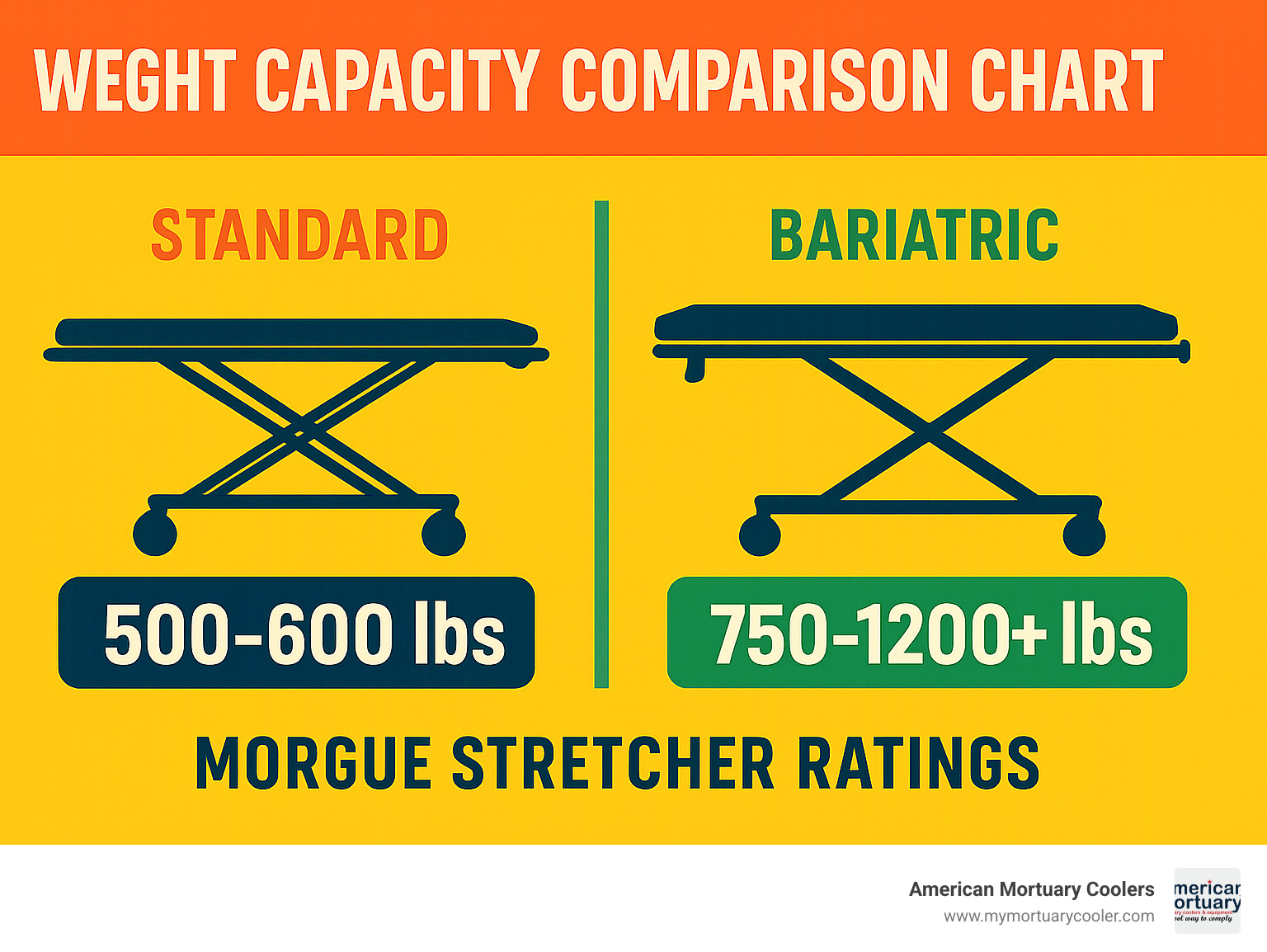
Height Adjustability & Mobility
Your back will thank you for choosing a morgue stretcher with good height adjustability. The difference between a stretcher that only has two positions and one with multiple height options becomes apparent after a long day of transfers.
Quality stretchers typically adjust from around 14" at their lowest to 35" at maximum height, with 5-6 positions in between. This range allows you to match the height of various surfaces—from low beds in homes to higher autopsy tables—without straining.
The adjustment mechanisms matter too. You'll find options ranging from simple release levers to hydraulic systems and pneumatic assists, with the latter providing the smoothest experience but often at a higher price point.
Don't overlook the wheels! Look for 5-8" diameter wheels with reliable locking mechanisms. Premium models like the Amico Titan Cadaver Stretcher even include a fifth wheel for improved steering—a feature you'll appreciate when navigating tight hallways or making sharp turns.
Surface Design & Infection Control
The top surface of your morgue stretcher does more than just hold the deceased—it plays a crucial role in maintaining hygiene and dignity throughout the transport process.
Well-designed stretchers feature recessed stainless steel tops with subtle drainage channels that direct fluids away from the body. This thoughtful feature makes a world of difference during challenging transports.
Look for seamless construction with welded seams that prevent fluid ingress into the frame—gaps and seams are breeding grounds for bacteria and can make thorough cleaning nearly impossible. Any mattress pads or covers should be easily detachable for cleaning or replacement.
As one funeral director from Nashville told me, "The ability to completely sanitize between cases gives us confidence, especially when handling communicable diseases." It's a sentiment I hear often from professionals who prioritize infection control.
Materials: Aluminum vs Stainless Steel
The "aluminum versus stainless steel" debate isn't about which is better—it's about which better suits your specific needs.
Aluminum morgue stretchers offer a lighter-weight option that's easier to maneuver, especially for smaller team members or single-person operations. With proper anodization, they resist corrosion well and typically come at a lower price point.
Stainless steel models, while heavier, provide superior stability and best corrosion resistance. They tend to have a more polished appearance and stand up exceptionally well to harsh cleaning chemicals over time.
Many modern stretchers like the MOBI F650 Pro Series take a hybrid approach, combining "high-strength anodized aluminum alloy with stainless steel for a lightweight yet robust design." This gives you the best of both worlds—the maneuverability of aluminum with strategic reinforcement where it matters most.
Safety Features & Certifications
Safety isn't optional when it comes to morgue stretchers—it's essential for protecting both your staff and the dignity of those in your care.
Professional-grade equipment should carry FDA, CE, and ISO 9001 compliance certifications. These aren't just fancy acronyms; they represent rigorous testing and quality assurance protocols that ensure the equipment performs as promised.
Look for reliable braking systems—"Posi-Lock" or similar wheel locks prevent unexpected movement during transfers. Secure fastening with durable buckle straps (typically 60" length) keeps the deceased properly positioned during transport.
Some models include thoughtful features like removable side rails to prevent shifting or automatic locking mechanisms where "load-end legs automatically unfold and lock during unloading." These small innovations can make a significant difference in your daily operations.
At American Mortuary Coolers, we've found that these details matter tremendously to the funeral professionals we serve. After all, when you're focused on providing compassionate care, your equipment should be the last thing you need to worry about.
Safe Operation, Cleaning & Maintenance of Your Morgue Stretcher
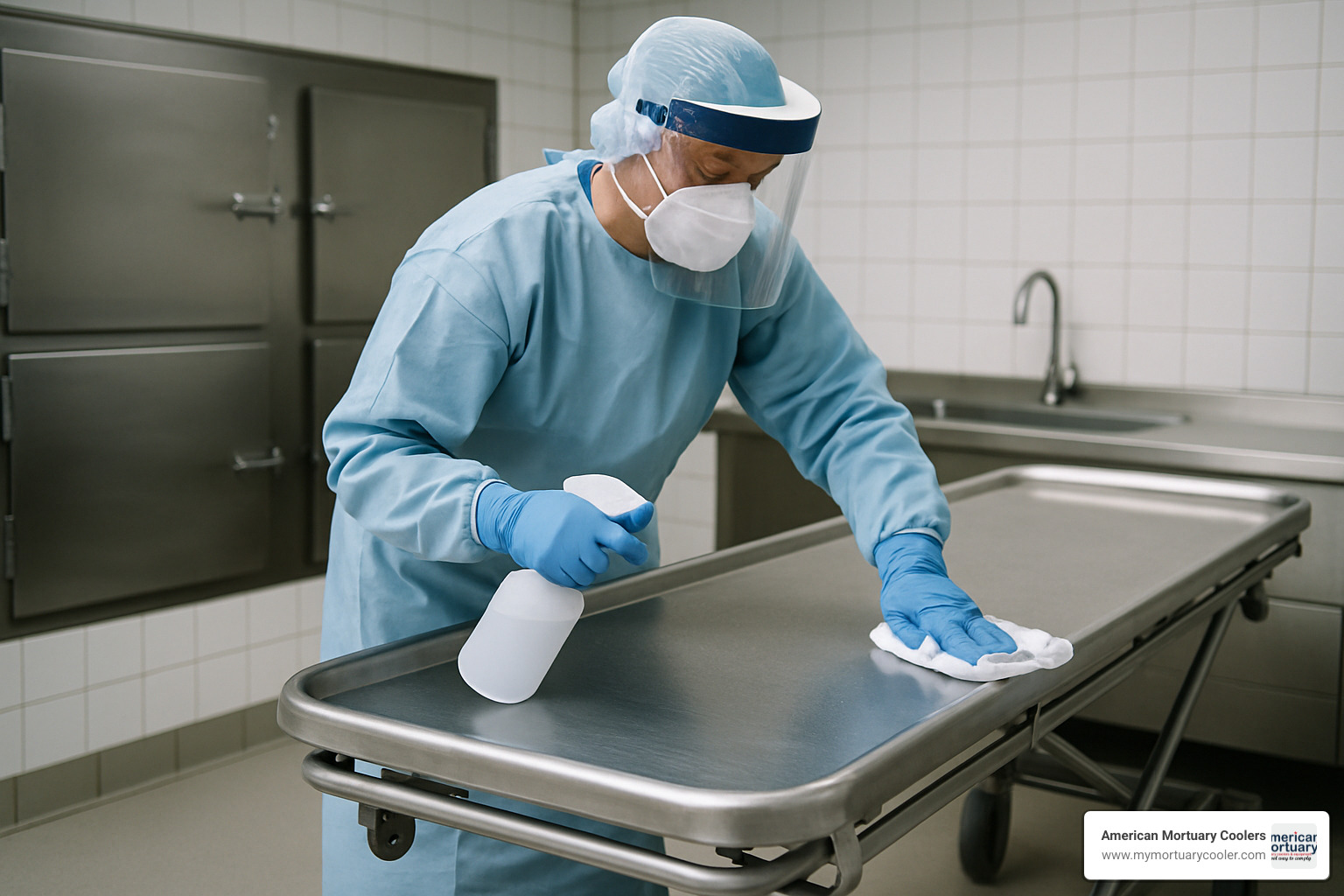
Taking proper care of your morgue stretcher isn't just about protecting your investment—it's about ensuring safety, maintaining dignity in your services, and extending the life of equipment that your facility depends on daily.
Operational Safety Checklist
Before each removal, take a moment to run through some quick safety checks. Start by testing those wheel locks—they should engage fully and hold securely, even on slightly sloped surfaces. I've heard too many stories of stretchers rolling unexpectedly during transfers!
Always position the deceased centrally on the stretcher to maintain proper balance during transport. This small step prevents tipping and protects both the deceased and your staff. Before moving, verify that all height adjustment mechanisms have fully engaged—that distinctive "click" sound is your best friend when it comes to safety.
"The special release levers on our Ferno Model 24 have been a game-changer," shared one funeral director from Kentucky. "They significantly reduce the effort needed to raise and lower the stretcher under load, which has made a world of difference for our team members working alone."
When operating solo, take advantage of features designed for single-person use, like multi-position loading heights and one-hand release mechanisms. And always clear your transport path before moving—those few seconds spent moving obstacles can prevent accidents that might damage your equipment or, worse, cause staff injury.
Infection Control & Easy-Clean Surfaces
Let's face it—maintaining proper sanitation with your morgue stretcher isn't just good practice, it's essential. Modern stretchers feature bleach-safe finishes that withstand hospital-grade disinfectants without deteriorating over time.
After each transport, take time to remove any visible biological material, apply your disinfectant of choice, and allow proper contact time as specified by the product. Those drainage channels need special attention—they're designed to direct fluids away from the body, but can harbor residue if not thoroughly cleaned.
"We've found that removable mattress pads make our cleaning routine so much more efficient," notes a mortuary manager from Texas. "Being able to completely detach components for thorough sanitizing gives us confidence that we're maintaining the highest standards."
Some premium stretchers now feature antimicrobial vinyl coverings that provide an extra layer of protection between cleanings. While these surfaces don't replace proper disinfection protocols, they do offer additional peace of mind in your infection control efforts.
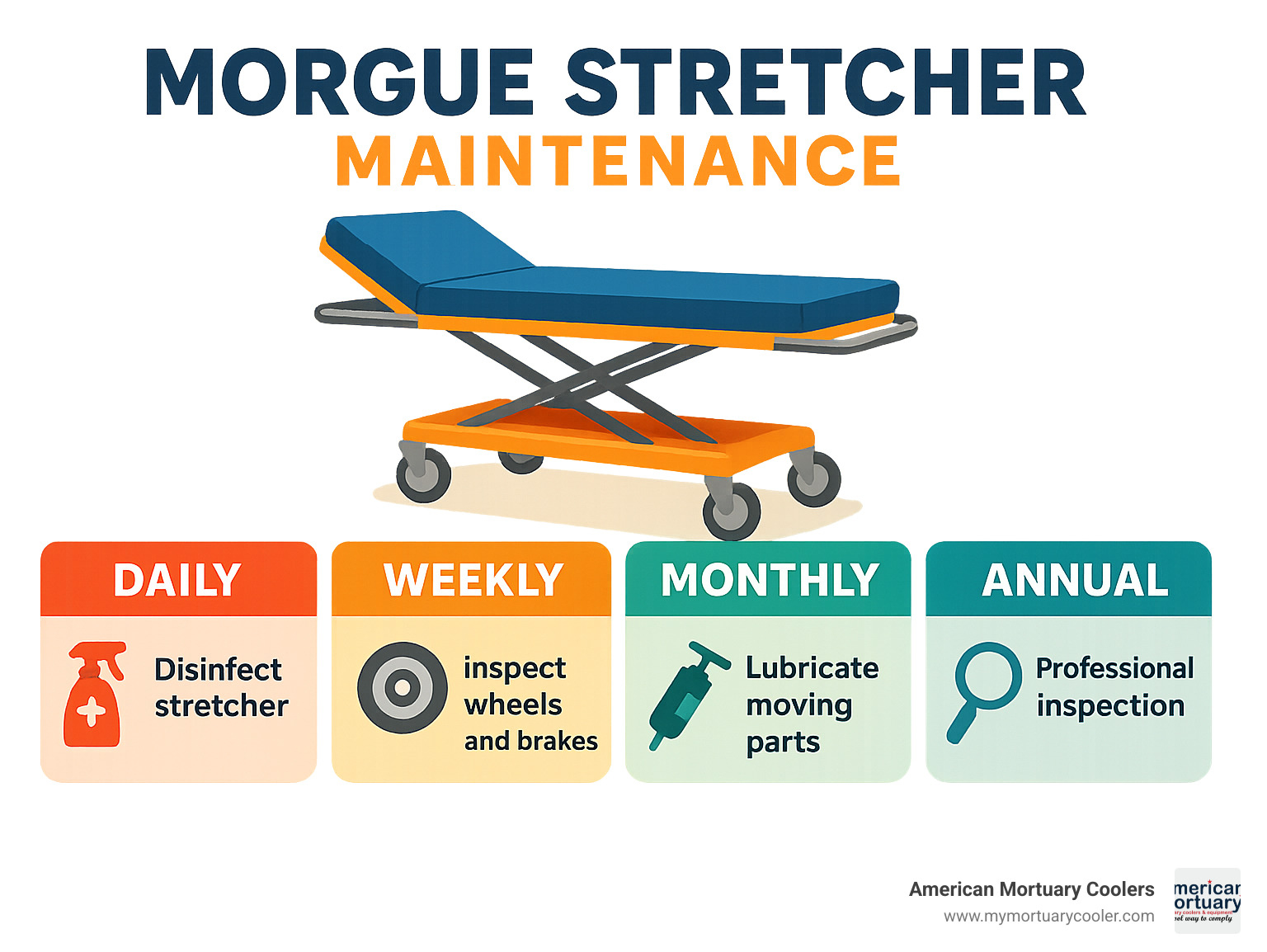
Routine Maintenance & Troubleshooting
A well-maintained morgue stretcher can provide decades of reliable service. One of our customers recently shared, "Our stretchers have been in service for over 25 years with only routine maintenance needed." This kind of longevity doesn't happen by accident—it comes from consistent care.
Set up a simple maintenance calendar with weekly wheel and brake checks, monthly lubrication of moving parts, and quarterly structural inspections. Pay special attention to frame welds, hydraulic systems, and locking mechanisms—these are the components most likely to show early signs of wear.
When minor issues arise, most have straightforward solutions. Wobbly wheels typically just need caster bolts tightened or, in some cases, wheel replacement. If height adjustment becomes sticky, cleaning and lubricating the release mechanisms often solves the problem. For brake issues, adjusting tension usually restores proper function.
For hydraulic systems, however, I always recommend contacting the manufacturer before attempting repairs. These components operate under pressure and require specialized knowledge to service safely. Plus, DIY repairs might void your warranty—something none of us want to find when we need warranty service most!
Speaking of warranties, make sure you're following all manufacturer maintenance guidelines. Those requirements aren't just suggestions—they're specifically designed to keep your equipment functioning properly and maintain your warranty coverage. A good practice is to keep a maintenance log that documents all service performed, which can be invaluable if warranty questions ever arise.
At American Mortuary Coolers, we're always happy to answer maintenance questions about any morgue stretcher in your facility, even if you didn't purchase it from us. After all, keeping your equipment in top condition ensures you can provide the dignified service families deserve.
Pricing, Leading Brands & Decision Checklist
Shopping for a morgue stretcher doesn't have to be overwhelming. The market offers options at various price points, with costs reflecting what you're getting in terms of capacity, materials, features, and warranty protection.
Typical Price Ranges & What Drives Cost
When budgeting for your morgue stretcher, understanding the price brackets can help set realistic expectations:
Entry-level models typically run $1,000-$1,500 and include basic aluminum construction with 500-600 lb capacity, manual height adjustment, and usually a 1-year warranty. These workhorses get the job done without breaking the bank.
Mid-range options fall between $1,500-$2,500, offering hybrid aluminum/stainless construction, increased capacity (600-750 lbs), smoother height adjustment systems, and better warranty coverage. These represent the sweet spot for many funeral homes balancing quality with budget constraints.
Premium models start around $2,500 and can exceed $5,000, featuring full stainless steel construction, impressive capacity ratings (750-1200+ lbs), hydraulic systems for effortless adjustment, and comprehensive multi-year warranties. These are investments that pay dividends in longevity and performance.
For perspective, the MOBI F500 costs around $1,095, while stepping up to the bariatric MOBI F1200 brings the price to approximately $1,595 – a $500 premium for more than double the weight capacity.
The biggest factors driving these price differences? Hydraulic systems add significant cost over manual adjustment mechanisms. Stainless steel construction commands a premium over aluminum. Higher weight capacity ratings, included accessories like covers and straps, and extended warranty protection all push prices upward.
Notable Manufacturers & User Feedback
The morgue stretcher market features several standout manufacturers with proven track records:
MOBI Medical has built a reputation for American-made equipment with competitive pricing. Their F500 (standard) and F1200 (bariatric) models consistently earn praise. As one user put it: "The price was unbelievable. I would recommend to anyone in the industry." Their straightforward designs prioritize function and reliability.
Ferno represents the old guard with decades of industry presence and battle-tested durability. Their Model 24 Mortuary Cot has stood the test of time, with one customer noting: "Over 25 years of use with only maintenance needed." That kind of longevity speaks volumes.
Techlem specializes in hydraulic systems and customization options. Their 5000C (standard) and 5000BRC (bariatric) models appeal to facilities seeking equipment with the "lowest cost of ownership over 10+ years," according to user feedback.
Amico pushes innovation with designs focused on hospital integration. Their Titan Cadaver Stretcher earns praise for its concealed platform design that one user called "invaluable for hospital settings" where discretion matters.
The Douglas County Coroner's office shared this telling testimonial: "We have transported 500-pound cases on several occasions, and the cots still work like new. It is a true workhorse and makes us look good!" When your equipment makes you look professional in difficult circumstances, that's value beyond price.
Accessories & Integration with Other Equipment
Your morgue stretcher is part of a larger workflow system, and accessories can significantly improve functionality:
Cot covers in vinyl or fabric provide privacy and improve infection control. Body straps (typically 60" with quick-release buckles) ensure secure transport. Slider boards make transfers between surfaces smoother, while removable mattress pads (1-2" thick) improve appearance and help manage fluids.
Thinking about how your stretcher works with other equipment is equally important. Will it slide directly into your mortuary coolers? Does its height adjustment range match your transport vehicles? Is it compatible with existing lifts and ramps? Could storage racks help maximize your facility space?
At American Mortuary Coolers, we design our cooling systems with standard stretcher dimensions in mind, creating seamless workflows that eliminate frustrating compatibility issues for our clients.
Customization & Facility-Specific Needs
Your facility isn't cookie-cutter, and your equipment doesn't have to be either. Many manufacturers offer customization options to address specific requirements:
Branding colors on bumpers and accents can maintain your visual identity. Logo panels personalize your equipment for easy identification. Vehicle height matching ensures your stretcher aligns perfectly with specific transport vehicles. Width variations accommodate particular facility doorways or elevators, while department labeling helps in multi-department settings.
Techlem, for instance, offers "logo personalization, color options, and department branding" to help facilities maintain consistent identification – a small touch that adds professional polish to your operation.
Quick Buying Checklist for Your Next Morgue Stretcher
When evaluating your options, keep these factors top of mind:
Weight capacity should exceed your typical needs by at least 20% for safety margin. Height adjustability must work with your vehicles and facility surfaces. Choose materials based on your cleaning protocols and expected usage intensity. Verify certifications like FDA, CE, and ISO 9001 compliance for quality assurance.
Compare warranty periods and what's covered. Assess mobility features like wheel size and braking systems for your facility's flooring. Consider single-operator features like automatic loading if staffing is limited. Evaluate included versus optional accessories to understand the true cost. Review maintenance requirements including lubrication points and service intervals. Finally, ensure compatibility with your existing equipment ecosystem.
Taking time to evaluate these factors now will prevent headaches later and help you select a morgue stretcher that serves your facility's needs for years to come.
More info about Funeral Home Stretchers
Frequently Asked Questions about Morgue Stretchers
What is the standard weight capacity of a morgue stretcher?
When funeral directors ask me about weight capacity, I always explain that most standard morgue stretchers support between 400-600 pounds. This covers the majority of situations you'll encounter in daily operations.
If you're running a smaller funeral home with typical cases, an entry-level stretcher supporting 400-500 pounds might serve your needs perfectly. For busier establishments handling a wider variety of cases, mid-range models in the 500-600 pound capacity offer added peace of mind.
I've worked with many funeral homes who occasionally handle larger individuals, and in these cases, specialized bariatric morgue stretchers are the way to go. Models like the MOBI F1200 impressively support up to 1,200 pounds, while the Techlem 5000BRC handles up to 750 pounds comfortably.
One piece of advice I always share: choose a stretcher with at least 20% more capacity than you think you'll need. This buffer not only ensures safety but also extends the life of your equipment. Pushing a stretcher beyond its rated capacity isn't just dangerous—it can void your warranty and create unnecessary risks for your staff.
How does height adjustability improve single-person operation on a morgue stretcher?
Height adjustability is truly a game-changer for funeral homes operating with limited staff. I've seen how this feature transforms the workday for many of our clients.
When you can perfectly match your morgue stretcher height to beds, autopsy tables, cooler trays, and vehicle floors, you eliminate the need for lifting altogether. This means less strain on your back and fewer calls for assistance from other staff members.
The ergonomic benefits are substantial too. Being able to raise the stretcher to a comfortable working height reduces the bending and stooping that leads to fatigue and injury over time. Many funeral directors tell me this feature alone has extended their career longevity.
I'm particularly impressed with models like the MOBI F650 Pro Series that offer independent height adjustment at each end. This clever design allows you to create slight inclines that make sliding transfers almost effortless—something your back will thank you for after decades in the profession.
The Ferno Model 24 Mortuary Cot exemplifies thoughtful single-operator design with special release levers that minimize the effort needed to raise and lower the stretcher under load. These seemingly small design touches make a world of difference when you're working alone.
What certifications should a morgue stretcher carry for regulatory compliance?
Navigating certifications can feel overwhelming, but they're your assurance that a morgue stretcher meets essential safety and quality standards. Let me break down what to look for:
First and foremost, in the United States, mortuary stretchers fall under medical device classification, so FDA registration is a must-have. This ensures the equipment meets basic safety requirements for its intended use.
For funeral homes working with international partners or simply wanting additional quality assurance, CE marking indicates compliance with European health and safety standards—often considered among the most stringent globally.
ISO 9001 certification is another valuable indicator, confirming that the manufacturer follows recognized quality management principles throughout their production process. This typically translates to more consistent product quality and reliability.
Some premium manufacturers go the extra mile with ANSI/RESNA testing, subjecting their stretchers to rigorous durability and safety evaluations. For components that might contact bodily fluids, biocompatibility testing verifies resistance to disinfectants and biological substances.
The MOBI F500, a popular choice among our clients, proudly carries FDA, CE, and ISO 9001 certifications. When investing in equipment that your staff will depend on daily, always request documentation of these certifications—especially if your facility undergoes regular inspections or accreditation reviews. We're happy to provide this documentation for any equipment we supply.
Conclusion
Choosing the perfect morgue stretcher is more than just a purchase—it's an investment in your daily operations, your staff's wellbeing, and the respectful care you provide to the deceased and their families. Throughout this guide, we've walked through the many considerations that should guide this important decision.
Today's market offers remarkable variety, from workhorse 500-lb capacity models that handle everyday needs to specialized bariatric stretchers supporting over 1,000 lbs for exceptional situations. The thoughtful evolution of features like fluid drainage systems, adjustable heights, and single-operator functionality shows how manufacturers have listened to the real-world needs of funeral professionals.
Here at American Mortuary Coolers, we see morgue stretchers as critical pieces in your overall workflow puzzle. Our team specializes in creating solutions where all your equipment works together seamlessly—from transport equipment to refrigeration systems to your unique facility layout. We're proudly based in Tennessee, but deliver our custom-crafted equipment across all 48 contiguous states, building relationships and equipment that stand the test of time.
When upgrading your equipment or outfitting a new facility, we encourage you to look beyond the price tag. Consider the full picture: durability that saves money over time, comprehensive warranty coverage that protects your investment, and thoughtful integration with your existing systems. The real-world testimonials we've shared speak volumes—quality construction and smart design create equipment that serves faithfully for decades, not just years.
Every funeral home has unique needs, and we'd love to help you find the morgue stretcher that's truly right for your specific situation. Our team is just a phone call away, ready to provide straightforward, expert guidance without the sales pressure. We believe in helping you make truly informed decisions about this essential equipment.
















